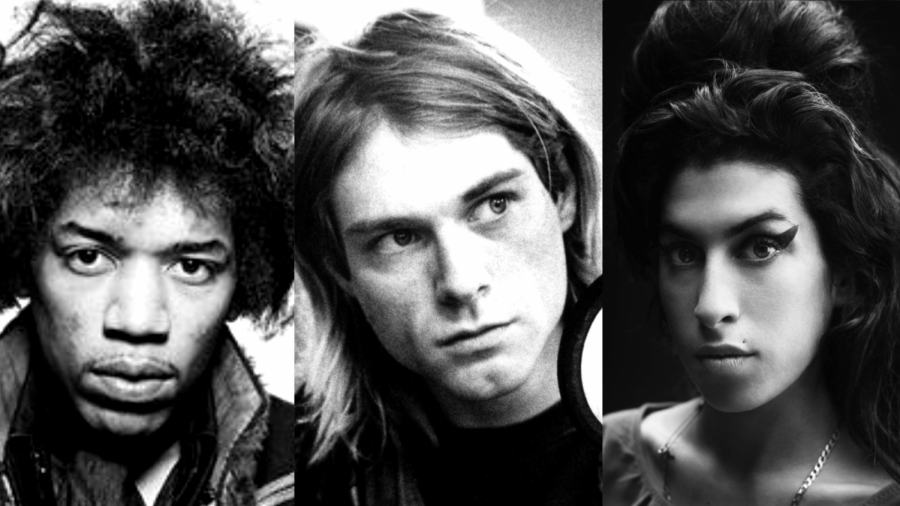The 27 Club and the Romanticization of Mental Illness in the Entertainment Industry
September 21, 2021
Twenty seven. It may seem like any other number, but in the wide world of conspiracy theories and controversy, this number represents one of the most popular myths in the modern age. This myth is a phenomenon known simply as The 27 Club.
For the uninformed, ‘The 27 Club’ refers to a series of celebrities, usually musicians, who died at the young age of 27. While the term is usually used for very speculatory ideas of the music industry and satanism, I would like to assure the reader that I am not talking about this aspect of the phenomenon. Instead, I want to look at this from a much more down-to-earth, realistic manner.
Sometimes, I find myself looking through the legacies that the victims of this phenomenon left behind and wonder what these artists had in common. Of course, they all died at such a young age, but did they share something in their lives other than death?
Let’s look at the most common examples of The 27 Club: Jimi Hendrix, Kurt Cobain, and Amy Winehouse. All of these artists are iconic and well-loved for making their mark in history with their unique and new artistic expression. However, another aspect these artists shared was the absolute turmoil they carried with them throughout their everyday lives.
Jimi Hendrix, famous for paving the way for future guitarists and having bombastic and explosive performances, struggled with alcohol addiction in his private life. When Hendrix drank, he often became angry and violent. His friend Herbie Worthington described it as him “turning into a [really really really mean guy really really mean].” Hendrix wrote a song titled “Manic Depression,” where he describes an illness very reminiscent of Bipolar Disorder. One could speculate that Hendrix wrote this song to vent about his frustrations with his emotions.
Kurt Cobain, founder and leader of revolutionary rock band Nirvana, often experimented with marijuana, alcohol, and even heroin at one point, all while he had been diagnosed with Bipolar Disorder.
Amy Winehouse was a famous English singer, known for her genre blending pop music and memorable performances and fashion. Her appearance became more and more frail as her descent into drug addiction prevailed, until she was brought to tears in her last performance.
Jimi Hendrix died of asphyxiation after overdosing on sleeping pills. Kurt Cobain commited suicide by gunshot, and Amy Winehouse’s alcholism got to her as she became too intoxitated for her body to handle. Years after their deaths, people still celebrate their artistry and time spent alive in this world.
But why do people love these artists so much? Their craft was unique, but why? One of Hendrix’s most iconic performances involved him burning his guitar on stage as he tore the strings out while shaking uncontrollably. After Cobain’s death, several personal journals of his were released without his permission, giving us a glimpse into his mental turmoil. And during her final concert, fans booed as Winehouse began to stumble and mumble on stage while performing her song “Back To Black.” Although it is difficult to assume, one could look at these sources and come to the conclusion that these struggles were never a secret to the public and to the fans.
But why do so many musicians live such difficult lives, especially to the point where they result in abusing substances or having mental breakdowns? Well, with almost any musician, there will be a label to control their professional life, which can affect their personal life as well. During a 1991 radio interview with Roberto LoRusso, Cobain stated that even with his major label contract with Geffen, he didn’t “have a place to live…$175,000. 33% tax bracket, 15% to our lawyer, 10% to our manager, $70,000 to sub pop, left us with about $20,000 to buy equipment.”
Britney Spears, while not a part of the 27 Club, cannot access her money because she is locked in a conservatorship with her label and…her parents of all things. Clearly, the biggest names get it the worst.
So, why wouldn’t people see any of these deaths coming? I believe that people view mental health in the entertainment industry as just another part of the act that one puts up while entertaining the masses. I’m not saying that those who struggle with mental health can’t make good art, or that their struggle isn’t part of their identity and expression, but treating it as if it’s the sole reason for the genius behind someone’s art is ridiculous and insensitive. Instead, we should reach out to those who are struggling with mental illness.
Artists are people too, and even though it may not be immediately apparent in their work, it is always something to keep in mind when discussing their personal lives.
